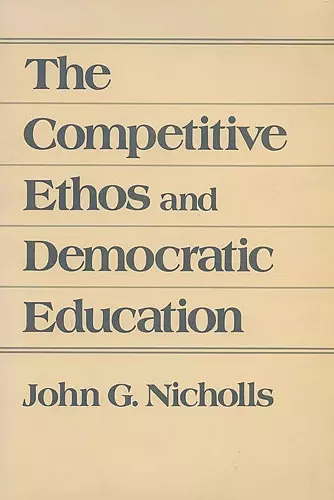The Competitive Ethos and Democratic Education
Format:Hardback
Publisher:Harvard University Press
Published:21st May '89
Currently unavailable, and unfortunately no date known when it will be back

Young children and even infants work hard at mastering various kills and show spontaneous pleasure at their own accomplishment. John Nicholls explores the conditions that cause students to lose their unselfconscious involvement in a game or task and become concerned with how they are stacking up against others. Charting the development of children’s concepts of luck, effort, and ability, he argues that with age they are increasingly prone to take superiority over others as the definition of success. An emphasis on interpersonal competition, which permeates Western society, exacerbates this egotistical tendency and results in diminished accomplishment and alienation from school.
To overcome these problems, Nicholls argues, we must “become as little children” for whom absorption in exploration and accomplishment come naturally, even when those around them are more competent. This ideal is unlikely to be promoted through technical approaches to education, or by the current emphasis on the role of education in economic development. Instead, Nicholls calls for a progressive approach to education. Difficult though it is to implement, this approach is most likely to increase equality of motivation for intellectual development, substantial accomplishment, satisfaction in work, and more productive relations with others. These are important ideas for anyone interested in achievement motivation, for those professionally involved in education, and for nonspecialists interested in, or worried about, how we educate our children.
Now that American schools are being heavily criticized for not meeting Japanese standards and ‘competitiveness’ has become a buzz-word, we badly need Nicholls’s wonderful book. Rooted in Nicholls’s masterful knowledge of the research literature on ego and task involvement, achievement motivation, and school performance (to which he has been a major contributor), it addresses central issues of educational values and strategy. Nicholls writes clearly and sometimes passionately. The reader is bound to emerge thinking differently about the ends and means of democratic education. -- M. Brewster Smith, Professor Emeritus of Psychology, University of California, Santa Cruz, and Past President, American Psychological Association
ISBN: 9780674154179
Dimensions: unknown
Weight: 544g
261 pages